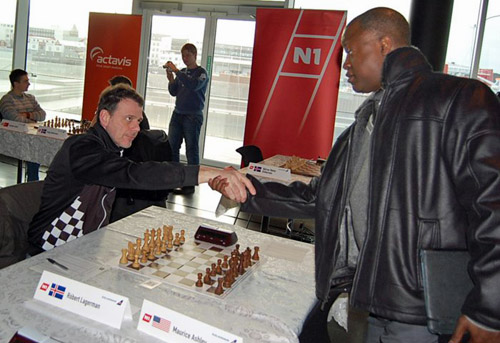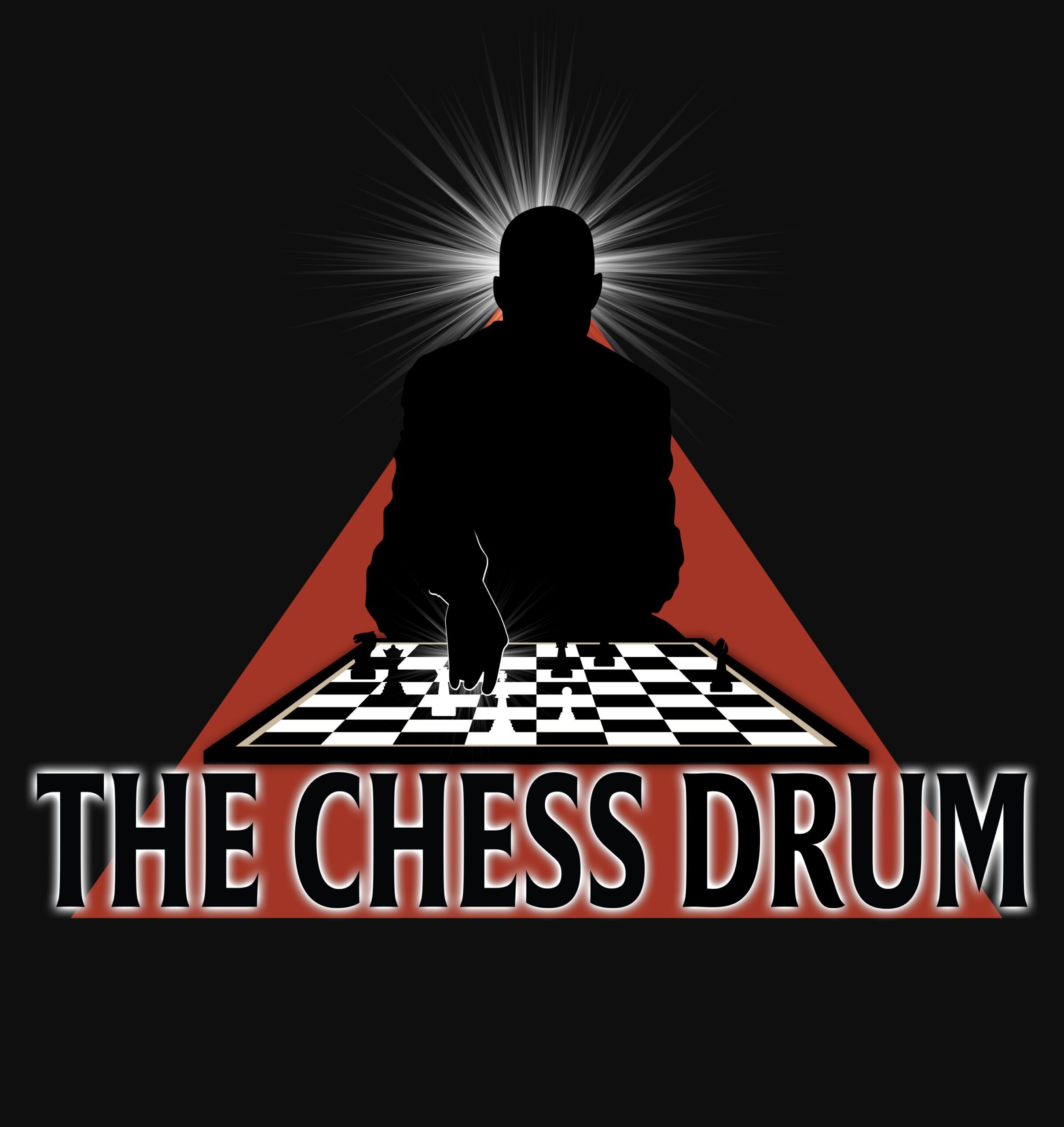Drum speaks with Maurice Ashley

GM Maurice Ashley (right) set to face FM Robert Lagerman at the 2012 Reykjavik Open. Ashley won in a crushing style. Photo by Hrafn Jökulsson.
The Chess Drum’s Daaim Shabazz was able to conduct an interview with GM Maurice Ashley and get an update on what the global icon has been doing in recent months. It has been awhile since Ashley has spoken to The Drum audience, but it was well worth the wait. The “brief” interview was 41.5 minutes. 😉
Ashley asked a number of questions about his recent trip to Reykjavik, Iceland, the Judit Polgar/Hou Yifan question, his current projects, his views on the upcoming World Championship in May, potential world champions, the problems in marketing chess and his views on playing for Jamaica in the Olympiad.
Many are questions never asked of him before. Great stuff!
Listen to interview with GM Ashley!


Thanks for this report. Interesting games.
What was your impression of the interview?
Thanks for the fascinating interview with Maurice Ashley! I love his ideas about the promotion of chess. I think GM Ashley, GM Nakamura, and Rex Sinquefeld, and other like-minded individuals should get together and form a committee to present idea changes to the current “traditional” presentation of tournaments and the world championship. I think those changes need to be heard and then implemented.
I thought Maurice demonstrated really relevant concerns for the game which are quite damaging in the long term. Having observed the way top events are run at the London Chess Classic I have to say that a lot of drama is needed to make the game popular. Kasparov generated that and Carlsen and the others seem more absorbed by playing the tournaments but not the big picture. Kasparov and Ashley see the big picture for chess.
It was interesting to hear his thoughts on Jamaican chess.Hopefully the players will look at the big picture in terms of long term development and set realistic, measurable and achievable goals for the Olympiad.
That was a great interview in many respects and it left me thinking about the direction chess will take in the near future. I’m very optimistic about the game spreading beyond the chess players themselves and into the general public. As Maurice stated , I think the technological advances being made will enable us to convey the intricacies of chess in a more fundamental way while displaying the special effects of the game in order to keep everyone interested. It just seems to me that blitz and rapid chess seems to generate more interest by the general public more so than anything else. After all, we do live in a society that seeks instant gratification. The poker analogy makes my point.
After the chess questions, I asked Maurice about the New York Knicks and “Linsanity”. Here is what he had to say! 🙂
Listen!
Jeremy Lin is out with a torn ligament in the knee and Amare’s back is going to keep him out awhile. The Bulls may just win four straight if they play the Knicks.
Maurice Ashley mentioned something that I expected: Anand is playing …”on cruise control…” and that when he defends his title in May his “…claws will come out…” I think this is another problem unique to chess that we don’t see in sports or even in poker. The impulse to hide your preparation and not show show your bag of tricks is so strong in chess that a world champion can’t go out and kill his opponents like in other games. I think spectators prefer to see a champ crushing and dominant all year long; they want to see the Mike Tysons and the Peyton Mannings.
The difference is in boxing, you lose one match, you’re not champion. Anand can still play, risk losing and keep his best for the championships.
Chess isn’t a spectator sport, it won’t ever reach a mass market because in order to appreciate a great move or positional idea you need to be a chess player. Even then, club players still can’t follow a lot of high level games without some kind of real time commentary.
There are too many GM’s chasing too little money, there is an incredible disconnect between the 30 or so players who get invited to the top tournaments and are World Championship contenders and the players at the level just below who literally can’t make a living without getting coaching fees from wealthy amateurs. This has always been the case in the west, Reshevsky was an accountant, Kashdan sold insurance, many English GM’s just gave up and got real jobs..its a tough gig.
Similarly, coaching moves in spectator sports are the most appreciated by people who actually play or coach the sport. In fact the chess analogy is most often used when two great coaches in any sport lock horns. The commentators call it a “chess match” knowing that the spectators as a whole don’t understand the intricacies of what the coaches are actually doing–though the analysis would be still be less complex than real chess. But the commentators don’t have to explain what’s going on, they just call it a chess match and awe-inspire the watchers!! It looks like the only hope for real chess is somewhere in there.
… and that’s exactly Maurice’s point. In his version, you don’t have to understand all the analysis. In fact, all the variations may miss the creative value of watching.
Maurice is a fabulous commentator and educator but he is still stuck with the problem that he is describing the intricate movements of symbolic pieces of wood around a chessboard that mean nothing to non chessplayers. Great moves in soccer or basketball can be appreciated even by people who have never played.
Raymond Keene for all of his perceived faults was the English equivalent of Maurice and would try and reduce positions down to the absolute basics for the watching TV audience in the days when important tournaments and matches actually got network television coverage in the UK. At the end of the day though it was just pushing pieces around a board as far as the general public were concerned.
Chess needs storylines and characters to hook casual players in, everybody knew who Fisher was, many people knew who Kasparov was..hardly anybody who isn’t a chess fan knows who Carlsen, Anand or Kramnik are. In Maurice’s terms they don’t ‘sell ‘ themselves or the game, they just like playing.
FM Ylon Schwartz
I find it hard to compare chess with any other sport or activity. Even poker is different. However, many watch poker without understanding any of the rules, but they simply get into the personalities of the players and the suspense of the cards drawn. People understand probability and that there are only 52 cards. They show the probability of winning hands which is genius.
The intrigue in poker is, who is this guy with the funny hat and dark glasses, how did he get there and most importantly who’s going to win the money? They also get to talk during the games. I have watched simply because I knew someone competing.
With chess there has to be side stories that don’t always focus on a series of moves. You can describe larger themes that are more suitable for understanding. Of course, you have to have skillful commentators that understand the balance of large themes vs. intricate variations. It can be done, but we haven’t figured it out. The point Maurice made about there being action-oriented points at short intervals is key. In chess, things unfold slowly despite activity (action) being constant. In other sports, there are scores and points to keep fans interested. We have to figure out how to create that.
Agreed. People watched Fischer (and took up the game) because of the personality effect. They followed the match without knowing how to play because Fischer was such an intriguing character (with an interesting history) playing a unique role of David vs. Goliath. Poker has a constant “underdog” factor since rank amateurs can get lucky and beat world champions. That will never happen in chess and it may make the game unapproachable as people will believe only elite people can play.
As far as media, (I agree) none of the top players today have the charisma or media savvy to attract non-chess fans. Anand? Carlsen? Kramnik? Aronian? Topalov? All are elite players and have either done commercials or had media exposure, but none of them will sustain a non-chess player’s interest. Kasparov was aggressive in his efforts to promote chess and that is why more people knew of him. One of my colleagues knew his name! I was impressed. None of today’s players are doing anything to promote chess on a large scale. Anand is a household name in India, but few non-chess people can name the World Champion.
Some people say we should use blitz, but do we want to cheapen chess? The issue (to the uninitiated) is that chess is harder to understand that all other sports and making it faster means that people will only become confused faster. Of course, they are speeding up cricket too. 😐
One of the virtues of chess is patience. If we as chess players aim to demystify the game and take the game to the people our problems are solved. As a chess player if Anand-Gelfand match is to be aired on t.v im going to watch the whole 7hrs no doubt. If we do it the right way round get a chess set in every home people will follow the game.
Good stuff. Daaim you handled the interview like a true professional and asked thought provoking questions, thank you. Quite a quandary we have before us in the chess world- how to make chess more generally appealing without completely ostracizing current loyal followers?
It seems to me that the higher up in rating you go the slower the time controls get and the less generally appealing chess seems. My friends/gf cannot fathom me going to a tournament on the weekend from 10 a.m.-4 p.m., and that’s just a quick 1 day event not a major event that last multiple days and much longer time control!
If the time controls are greatly increased to say 30 minutes a side in big competitions moves will be made more often for the less analytically inclined to observe but would that actually win over my players? I’m not sure, I think certain types of people are drawn towards chess but it would catch the attention of more people. I think the difference in chess from say poker is that chess players can’t really show personality/don’t have personalities (sorry, fellow chess players :P…just look at Lenderman prototype of a chess player -snore-) because of rules no talking etc., so you don’t get the banter in the game like you do in poker between players. And in post game analysis players just nerd out lines w/ one another trying to prove stuff that most people can’t even recognize… We need chess players who are outspoken, humorous, and don’t come across as chess obsessed.
Actually Lenderman is a very interesting person when you talk to him. If you’ve ever seen Emory Tate analyze in post-game analysis, it is a thing of beauty… almost like a theatrical production.
What I have found however, is that many of the top players lack charisma and have an aura of self-importance that is almost sickening. You see them at tournaments and many are aloof and only interact with other GMs. It kills any chance for widespread appeal.